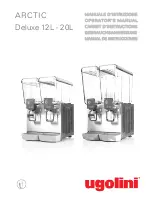
8.1 CLEANING THE CABINET
• Proper cleaning of stainless steel requires a soft cloth, never use steel pads, wire brushes or
scrapers.
• Cleaning solutions need to be alkaline or non-chloride cleaners. Any cleaner containing
chlorides will damage the protective film of the stainless steel. Chlorides are also commonly
found in hard water, salts, household and industrial cleaners.
• Routine cleaning of stainless steel can be done with soap and water. Extreme stains or
grease should be cleaned with a non-abrasive cleaner and plastic scrub pad.
• Stainless steel cleaners available which can restore and preserve the finish of the steel’s
protective layer.
• Never use an acid based cleaning solution. Many food products have an acidic content
which can deteriorate the finish — these items include peppers, tomatoes and
other vegetables.
• Be sure to clean ALL food products from any stainless steel surface.
• The interior of the cabinet should be cleaned only with lukewarm water, taking care not to
scratch the galvanized metal surface. Mild detergents are recommended.
8.2 DEFROSTING
The unit will not require defrosting if the door is only opened for a minimum time. Should ice
form on evaporator turn unit off and allow to defrost. Make sure the door closes properly and
gasket seals completely as warm air entering the unit will cause evaporator to freeze and
malfunction. Do not use a pick, knife, etc., to pry ice from evaporator as this could puncture
evaporator or damage the coils.
8.3 CLEANING CONDENSER COIL
• Clean the condenser coil every three months. A dirty condenser will reduce the performance
of the cooling system.
• Do not block airflow to the perforated panel and do not operate the Pro-Line Wine unit in
environments above 100˚F.
• Disconnect unit from power supply.
• Remove compressor cover panel and carefully blow out any dust or debris on or around the
condensing unit.
• Use a vacuum or compressed air to blow though the condenser coil.
• THE CONDENSER MUST BE CLEANED AT REGULAR INTERVALS (30-60 DAYS). FAILURE TO
DO SO CAN CAUSE COMPRESSOR MALFUNCTION AND WILL VOID WARRANTY.
• If you keep the condenser clean you will minimize your service expense and lower your
electrical costs. Failure to maintain a clean condenser coil will cause high temperatures and
excessive run times. Continuous operation with dirty or clogged condenser coils can result
in compressor failures.
9
MAINTENANCE
DANGER
Power must be turned off
and disconnected from the
power source whenever
performing maintenance,
repair or cleaning the
condensing unit.
| 16
PRO-LINE WINE INSTALLATION, USE AND MAINTENANCE GUIDE









































